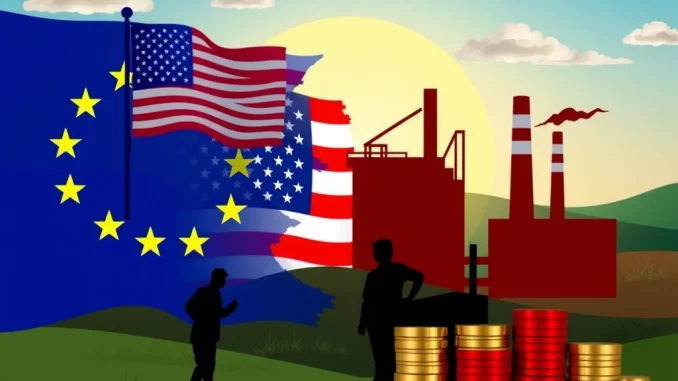
In the dynamic world of global economics, shifts in trade policy can send ripples across markets, including the fascinating realm of cryptocurrencies. While not directly linked, the macroeconomic environment shaped by government decisions on trade, tariffs, and international business flows significantly influences investor sentiment and capital movement. A recent statement from former U.S. President Donald Trump highlights just such a potential shift, one that could impact the landscape for European companies and the broader global economy.
What Did Trump Suggest About Trump Tariffs and EU Business?
According to a report by Walter Bloomberg on X, U.S. President Donald Trump has suggested a potential path to ease trade tensions with the European Union. His statement indicated a willingness to consider delaying or altering EU tariffs currently in place or under consideration. However, this potential delay comes with a significant condition: if European companies begin moving their operations, manufacturing facilities, or headquarters to the United States.
This isn’t the first time Trump’s approach to trade has involved using tariffs as leverage to encourage domestic economic activity and job creation. His previous administration saw the implementation of various tariffs, particularly on goods from China and the EU, aimed at renegotiating trade deals and protecting American industries. This latest suggestion reiterates a core tenet of his ‘America First’ economic policy.
How Could This Impact US Trade Policy and Global Business?
This proposal, if pursued, could have several key implications:
- **Leverage in Negotiations:** It provides a strong incentive for the EU and individual European companies to engage in discussions about relocating operations. Tariffs represent a direct cost to businesses importing goods, making the prospect of avoiding them a powerful motivator.
- **Potential for Investment:** A successful implementation could lead to increased foreign direct investment (FDI) in the United States as European companies assess the benefits of being physically present in the U.S. market, closer to customers, and potentially facing fewer trade barriers.
- **Shifting Supply Chains:** It could accelerate the trend of companies re-evaluating and potentially restructuring their global supply chains, moving away from complex international routes towards more localized or near-shored production.
- **Geopolitical Implications:** The EU’s response will be crucial. Such a direct link between trade policy and corporate location could be seen as protectionist pressure, potentially straining transatlantic relations.
For companies, the decision to undertake company relocation is complex. It involves significant investment, logistical challenges, workforce considerations, and navigating different regulatory environments. The potential benefit of avoiding EU tariffs would need to outweigh these substantial costs and complexities.
What Does This Mean for Markets, Including Crypto?
While not a direct driver for Bitcoin or other cryptocurrencies, major shifts in global trade policy and economic incentives create ripples. Increased FDI into the US, changes in corporate profitability due to tariff avoidance or imposition, and potential shifts in international economic power dynamics can all influence the broader investment climate. Crypto markets, known for their sensitivity to macroeconomic news and global stability, could react to the uncertainty or the perceived economic impact of such policies. Investors often look for hedges against traditional market volatility or potential inflation, and shifts in trade relations contribute to this macro picture.
The suggestion links EU tariffs directly to investment decisions, a powerful tool in the arsenal of US trade policy. It signals a potential return to a more transactional approach to international trade relations, where market access and tariff levels are explicitly tied to corporate behavior and location.
Looking Ahead: The Path for European Companies and US Policy
The feasibility and eventual impact of this suggestion remain to be seen. It depends heavily on political developments, the willingness of European companies to consider such a significant move, and the specific details of any proposed tariff delays or removals. However, the statement itself is a clear indicator of a potential direction for future US trade policy under certain leadership scenarios.
For readers interested in the broader economic forces that shape the financial world, keeping an eye on these developments is essential. Changes in Trump tariffs, EU responses, and the strategic decisions made by European companies regarding company relocation are all pieces of a complex global puzzle. Understanding these shifts provides valuable context for analyzing market movements, including those in the cryptocurrency space.
Summary
Donald Trump’s suggestion linking the delay of EU tariffs to European companies relocating operations to the US highlights a potential future direction for US trade policy. This approach uses tariffs as a direct incentive for foreign investment and job creation within the United States. While the practicalities and feasibility of widespread company relocation are complex, the statement underscores a transactional view of international trade. For those tracking global markets, including crypto, these macro-level policy discussions are crucial for understanding the economic backdrop that influences investment decisions and market sentiment worldwide.



